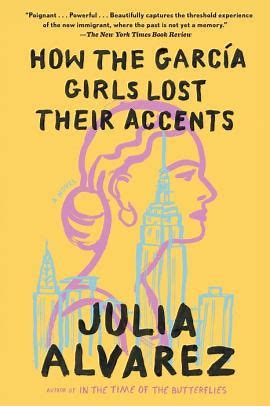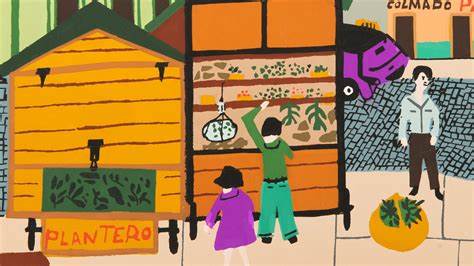Physical Address
304 North Cardinal St.
Dorchester Center, MA 02124
Physical Address
304 North Cardinal St.
Dorchester Center, MA 02124

How the Garcia girls lost their accent is the story that follows four sisters who immigrate from the Dominican Republic to the United States as teenagers setting in 1960s during the dictatorship of General Rafael Leonidas Trujillo Molina. “The Four Girls”, Carla, Sandra, Yolanda, and Sofia face internal conflicts to hold onto their own culture while struggling to adapt to a new language and a new home away from home.

•Carla is the oldest daughter who became a child psychologist and has been mentioned to have been the responsible one. Her husband is an analyst. Carla wrote a thesis, criticizing their mother’s color-coding system that she used for her four daughters while growing up. A short story is later shared, giving a glimpse of Carla as a child. When Carla was little, and the family was poor, she really wanted a pair of red sneakers. A neighbor gave Carla a pair of shoes that were just her size. However, they were white, not red. Carla had a fit and threw the shoes at the wall. Mom later caught Carla and her dad painting the sneakers red with nail polish.
•Sandra is the second oldest daughter. She was always a light skinned, blue-eyed, pretty girl, but suffered from eating disorder and possible mental disorder as well. Sandra was on an intense diet and lost weight. She lost even more weight at grad school, so much so that the dean had to call her parents to let them know she was in the hospital. She also became obsessed with reading because she felt in her mind that she would turn into a monkey and forget about humanity. Her parents chose to admit Sandra into a mental hospital. Mom doesn’t speak on the matter and says she wants to “forget about the past”. Sandra was released from the mental hospital a month ago. Nickname: Sandi
•Yolanda is the third sister; she is mentioned to have always been the creative one. Her widow’s peak gave her a heart-shaped face. She was an aspiring poet. Her mother had hoped she would become a famous writer. Her mother would always go to her poetry readings in support. She eventually gave up and is now a teacher. Yolanda was once married to a man named John but ended in divorce. When she was younger, she took the opportunity to be the wildest of her sisters. Her “vivacious” personality caught up to her in college when she chose to continue to be flirty, but refrain from sex due to her Catholic beliefs. She visits the island after five years and Indulges in her “antojo”, guavas. Nicknames: Yo, Yoyo, Joe (in the U.S.)
•Sofia is the youngest sister, the only one to not have a college degree, and is said to have had “non-stop boyfriends”. She is a mother of two, her second born being the first boy in two generations, he is named Carlos, after her father. She was the first daughter to leave home despite being the youngest sister. Her dad went through her personal love letters in her room, which erupted into a big fight, causing her to leave and go fly to Germany to an elope with Otto. They didn’t speak for months and remained tense around each other. Party is held that Sofia ‘s house to celebrate both Carlos’ 70th birthday and little Carlos’s christening brings the husbands together which usually wouldn’t happen for their dad’s birthday. Sofia put much effort into this party with hopes of helping mend their friendship and years of tension. The party was a success, lots of guests, a great band, food, cake presents, balloons, cheesy “World‘s Best Dad” decorations, the whole nine yards. All efforts get diminished when during a blindfold party game, Sofia humiliates her dad in front of everyone by giving him a very wet, sexual, inappropriate kiss in his ear, causing the dad to abruptly end the party. Nickname: Fifi.
•Papi / Carlos is the father of the four girls. In regard to him not having daughters, would say, “good bulls sire cows” to make himself feel better. After reading Sofia’s personal letters he calls Sofia, a whore, and accusing her of ruining the families good name-his name. He wasn’t as excited for his granddaughter ‘s birth, as he was for his grandson’s birth.

This book is told in reverse chronological order, starting off in 1989 with the girls as adults, having already gained the wisdom and perspective of an adolescent immigrant, who came of age in the United States. The time away is evident in chapter 1, Yolanda catches herself slipping, even in conversation she’s out of practice with her Spanish, even though it’s her native tongue. She gets scolded by one of her tías, “¡ en Español!” when she tries to revert back to English. She has the reversed problem after visits, she forgets her English once returned to the states. A breadcrumb hint comes to light that it’s possible she might not be returning to the US but hasn’t told anyone. So, I’m excited to see where the story goes with that hint. Her tías ask her if she has an antojo, or craving. She shares her idea of traveling north by herself to indulge in good guavas. Proving yet again that she has been gone too long. This is not the US., woman cannot travel on such embark by herself. Her tías persist in arrangements being made so she doesn’t go alone. This first chapter represents examples of Cultural Hybridity, Language & Cultural Loss, and Cultural Retention through Yolanda’s struggle between two languages, the pressures to speak her native tongue when in her native country and her sticking to her newly adopted American mentality that she can take care of herself, even though those circumstances just are not the case.
In chapter 2, conflicts are brought to light showing character development between Sofia and her Papi. Intergenerational Conflicts are displayed as Sofia seems to be the only child with no college education or degree. In short – she chose love and happiness over success, mixed in with spiteful feelings. This is a common pressure put on immigrant children by their parents. Many immigrants look at education and careers as the setting stones to the American Dream. Sofia seems to me to be looked at as “the headache” by her dad, perhaps due to her resistance towards Americanization, or because she isn’t assimilating the way he wants her to. I have a feeling these factors might play a small part in his animosity towards Sofia. After all, he accuses her of ruining the family name- his name. Circling that moment back onto himself. During the party, he has an (although drunk, I find it worth mentioning) moment of self-reflection. Displaying his older generation perspective, and how immigration has affected him personally.
“The older the evening got, the more withdrawn the father had become. Surrounded by his daughters and their husbands, and fancy, intelligent, high talking friends. He seems to be realizing that he was just an old man sitting in their houses, eating up their roast, impinging upon their lives. The daughters could almost hear his thoughts inside their own heads. He had paid to straighten their teeth and smooth the accent out of English in expensive schools, he was nothing to them now. Everyone in this room would survive him…”.
In chapter 4, a key theme explored through Yolanda is Identity Negotiation, and the Search for Belonging. A Strategy she uses to navigate her identity is displayed through the use of nicknames. She seems to not be so fond of Yolanda as it categorizes her. Yo, could be short for Yolanda, but by allowing Joe to be used in place of, she changes her name to sound more American and conform to American social-normals. This also overlaps with Cultural Hybridity, showing how Yolanda is choosing to blend her cultures together. She seems to have a moment of awakening when coming to terms with her divorce from John. “We just didn’t speak the same language”, meaning it’s not all black-and-white. Culture Hybridity takes much more than just simply both speaking English.
In chapter 5, Yolanda displays various examples of social interactions and how they affect her. For instance, a teacher told her she had a “vivacious” personality. This leads her go to a dictionary to look up the meaning of the word, causing her to develop a Strategy. “English was still a party favor for me – crack open the dictionary, find out if I had just been insulted, praised, admonished, or criticized.” Key themes displayed here are Cultural Hybridity, along with the impact of Language & Cultural Loss. Language barriers continue to add complexities while trying to assimilate to the culture. Self-Identity, and a Lack of Belonging in school continues to affect her efforts to assimilate with the culture.
He called roll, acknowledging most of the other students with nicknames and jokes and remarks stumbling over my name and smiling falsely at me, a smile I identified as one flashed on “foreign students” to show them the natives were friendly. I felt profoundly out of place.
Yolanda
Yolanda also has experiences outside of school within personal relationships and internal conflicts. With impeccable timing, the 60’s was considered to be a sexual awakening. “Everyone was sleeping around as a matter of principle”, as Yolanda puts it. She experienced internal conflicts from her own cultural Catholic beliefs, to remain a virgin verses external pressures to sleep around just because it’s considered a social-norm to do so in college. Cultural Retention VS Assimilation Pressures is a common conflict of themes regarding how Yolanda chooses to navigate her sexual reputation. Unfortunately, it is an inevitable, Social Critique is always to come through forms of stereotypes when Yolanda‘s college boyfriend makes the stereotypical comment “I thought you’d be more hot-blooded, being Spanish and all”. Yolanda aspires more for her herself than to be that “hyper-sexualized Latina”. Overall, it seems to me all sisters, besides Yolanda, are fully assimilating themselves into the Acculturation of this new culture. Yolanda seems to still want to hold on to her native culture. I suspect more than one Acculturation Model being challenged as I embark on part two of this novel.

Comments are closed.
First of all, the organization on your website is great! I especially like how you divided each type of literature into its own individual tab. I think that creates an easy to navigate site! Second, I really enjoyed reading your blog post #1 on your novel. Not only did you give a well written summary, but I like how you added your own opinions to it. It added a great personalized touch to your writing.
I loved your breakdown of the story. Very organized and it pulls your readers in. Your personal touch on your page is amazing. I look forward to reading the book in the future.
I love the details, everything is so well written and organized! I also like how you added a quote from the book, it shows the characterization of Yolanda. Great job!